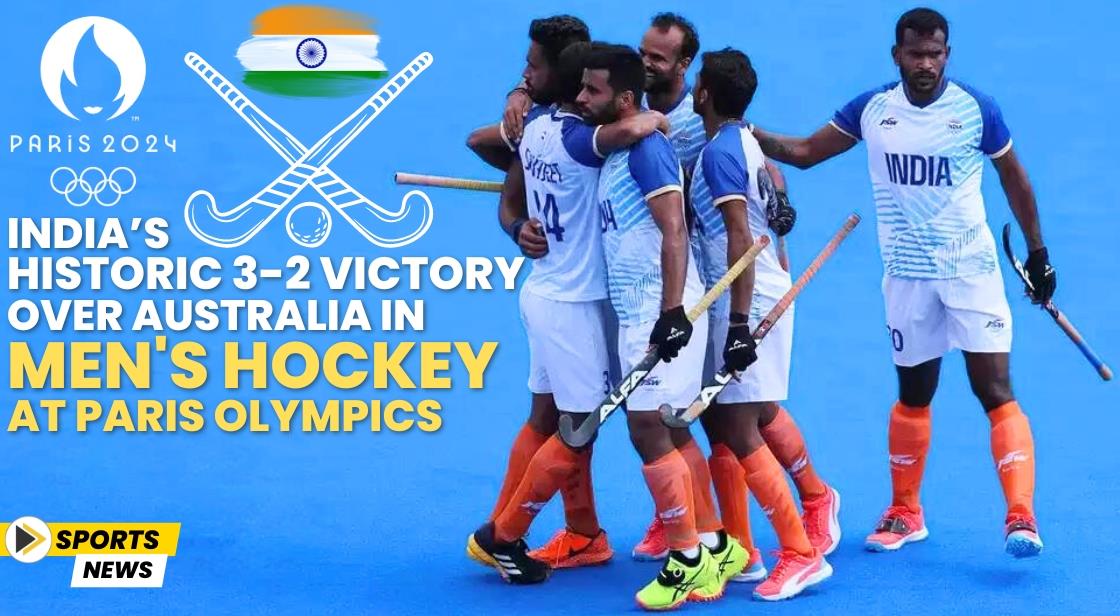India’s Historic 3-2 Victory Over Australia in Men's Hockey at Paris Olympics

News Synopsis
India’s 3-2 victory over Australia in the men’s hockey event at the Paris Olympics 2024 is a landmark achievement, ending a long-standing Olympic rivalry. With this win, India has demonstrated both skill and determination, setting the stage for a promising quarterfinals campaign.
The match not only highlighted the individual brilliance of players like Harmanpreet Singh and Abhishek but also the crucial role of goalkeeper PR Sreejesh. As the tournament progresses, India’s performance will be closely watched as they continue their quest for Olympic glory.
Indian Men's Hockey Team Stuns Australia 3-2 at Paris Olympics 2024
In a thrilling conclusion to the group stage of the Paris 2024 Olympics, the Indian men’s hockey team achieved a historic 3-2 victory over Australia. This match, held at the Yves-du-Manoir Stadium, marked India’s first Olympic win against Australia in hockey since the 1972 Munich Games, a gap of 52 years. With this win, India secured a place in the quarterfinals and surpassed Australia in the standings.
Historic Victory and Quarterfinal Qualification
On Friday, the Indian hockey team delivered a stunning performance, defeating the Tokyo Games silver medallist and their long-time rivals, Australia, in a crucial Pool B match. This victory not only ended a 52-year wait for an Olympic win against Australia but also demonstrated India's resilience and skill on the field. By finishing the group stage with three wins, two draws, and one loss, India moved into the quarterfinals. They displaced Australia, which now holds the third spot in the pool with three wins and two losses.
Key Moments and Scoring Breakdown
The match began with a quick offensive strike from India. Abhishek opened the scoring in the 12th minute through a swift counter-attack. The lead was soon doubled by Indian skipper Harmanpreet Singh, who scored from a penalty corner just a minute later. Harmanpreet continued to play a pivotal role, scoring a third goal early in the third quarter, which helped India maintain their lead.
Australia managed to score two goals during the match. Tom Craig found the net in the 25th minute, while Blake Govers added another in the 55th minute. Despite these efforts, Australia's attempts to equalize were thwarted by Indian goalkeeper PR Sreejesh, who made crucial saves throughout the game. This match was particularly significant as it was Sreejesh’s final international tournament, adding an emotional layer to his performance.
Defensive Stalwart PR Sreejesh
In the second quarter, Sreejesh made several key saves, including one that prevented a goal from Aaron Zalewski’s shot, which was redirected by Tom Craig. Sreejesh's goalkeeping was instrumental in keeping the Australian team at bay and securing India’s victory.
Controversies and Missed Opportunities
In the final quarter, India had a goal from Abhishek disallowed after a referral for a stick tackle, which prevented them from extending their lead further. Despite this setback, India maintained their advantage and held on for the win.
Context and Competition Standing
This match was the eighth encounter between India and Australia this year, with Australia having won the previous seven games. This recent victory is a significant turnaround for India, showcasing their ability to compete at the highest level.
In the broader context of the tournament, the reigning Olympic champions, Belgium, have won all their matches and are placed at the top of the standings. Argentina completes the top four with two wins, one loss, and one draw.
History of the Olympics
Origins and Ancient Greece
The Olympics have a rich and storied history, beginning in ancient Greece. The first recorded Olympic Games took place in 776 BC in Olympia, Greece. These games were held every four years in honor of Zeus, the king of the Greek gods. The ancient Olympics featured a range of athletic competitions, including running, wrestling, chariot racing, and the pentathlon, which included discus throwing, javelin, long jump, and running.
The ancient Games were a major religious festival and a symbol of Greek unity. They continued for nearly 12 centuries until they were abolished by the Roman Emperor Theodosius I in AD 393, who deemed them a pagan practice.
Revival of the Modern Olympics
The modern Olympic Games were revived in the late 19th century, thanks largely to the efforts of Pierre de Coubertin, a French educator and historian. In 1894, de Coubertin founded the International Olympic Committee (IOC) with the aim of reviving the spirit of the ancient Games. The first modern Olympics were held in Athens, Greece, in 1896. This revival was designed to bring together athletes from around the world in a celebration of peace and sport.
Growth and Expansion
Since their revival, the Olympics have grown in size and scope. The Games were initially limited to a few sports, but they have expanded to include a wide range of athletic disciplines. The modern Olympics have seen the introduction of winter sports, beginning with the first Winter Olympics in Chamonix, France, in 1924.
The Olympics have also been the stage for significant historical events and cultural moments. For example, the 1936 Berlin Olympics were used by Nazi Germany to promote its ideology, while the 1968 Mexico City Olympics saw iconic protests by African-American athletes Tommie Smith and John Carlos.
Post-War Developments
The post-World War II era saw the Olympics become a global phenomenon, with the Games serving as a platform for international diplomacy and competition. The Olympics were affected by geopolitical tensions, such as the boycotts of the 1980 Moscow Olympics and the 1984 Los Angeles Olympics by various countries.
In recent decades, the Olympics have continued to grow, incorporating new sports and increasing participation. The 2000 Sydney Olympics were notable for their successful integration of women's events and the 2008 Beijing Olympics for their impressive opening ceremony and spectacular infrastructure.
Recent Changes and Innovations
In the 21st century, the Olympics have faced new challenges and innovations. The inclusion of more sports, such as skateboarding and surfing in the Tokyo 2020 Games, reflects the IOC’s effort to modernize and appeal to younger audiences. The Games have also made strides in sustainability and technological advancements, including digital broadcasting and the use of advanced analytics for performance improvement.
The Olympics continue to evolve, striving to balance tradition with modernization. The Games are now a global event, with billions of viewers from around the world. The next Summer Olympics will be held in Paris in 2024, and the Winter Olympics will be in Milan-Cortina in 2026.
Legacy and Impact
The legacy of the Olympics extends beyond the Games themselves. The Olympics have promoted international understanding and cooperation, inspired countless athletes and spectators, and contributed to the development of sports infrastructure worldwide. They serve as a reminder of the power of sport to unite people across cultures and nations.
The history of the Olympics is a testament to the enduring human spirit and the quest for excellence. From their ancient origins to the modern era, the Games continue to captivate and inspire people around the world.
You May Like









